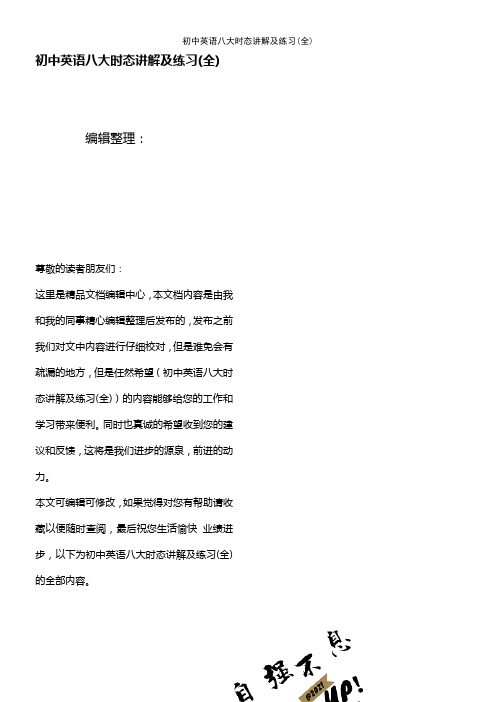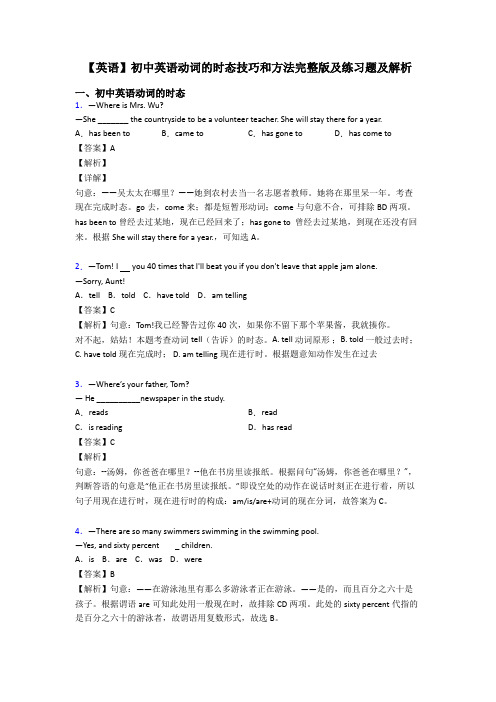初中英语时态练习句子翻译完整版
中考复习 八种时态练习题 六种基本句型翻译训练

1 1 八种时态练习题 + 六种基本句型翻译训练 一、辨形练习 1. Time flies.2. Class begins!3. The man doesn’t smoke.4. We all laughed.5. Everybody has arrived. 6. I am crying.7. The sun rises.8. Does it hurt?9. The book sells well.(sell等词用主动形式表示被动意义) 以上9个例句均属于 句型结构。 1. This is an English-Chinese dictionary.2. The book is interesting.3. The dinner smells delicious. 4. Everything looks different.5. His face turned red.6. He feel happy.7. The weather becomes warmer. 8. I’m happy to meet you.9. They are willing to help. 以上9个例句均属于 句型结构。 1. Who knows the answer?2. She laughed at him.3. He understands English.4. Tom made cakes. 5. They ate some apples.6. Danny likes donuts.7. I want to have a cup of tea.8. The teacher said “Good morning.” 以上8个例句均属于 句型结构。 1. Lily passed her sister a new dress.2. He cooked her a delicious meal.3. She bought her husband a new watch. 4. He brought you a dictionary.5. I told her nothing.6. I gave him my pictures.7. I gave him a hand. 2
中考初中英语动词时态分类及经典例句

中考初中英语动词时态分类及经典例句考试要求:英语的动词的时态共有十六种,但是中考常考的主要有八种,一般现在时、一般过去时、一般将来时、现在进行时、现在完成时、过去进行时、过去将来时,过去完成时等时态的构成和用法。
1. 一般现在时一般现在时的构成:一般现在时主要用动词原形表示,如果主语是第三人称单数,一般在动词原形后加-s或-es。
例如:I have breakfast at 7 every morning. 我每天早晨7点吃早餐。
He goes swimming on Sundays. 每周日他都去游泳。
一般现在时的用法:(1)表示经常发生的动作或者经常存在的状态。
经常和表示时间的状语often,always,usually,sometimes,every day等连用。
例如:My sister usually goes to school on foot.我姐姐经常步行去上学。
We often come to school at six in the morning.我们经常在早上六点到学校。
(2)表示某种习惯或者能力,也可以表示职业、特征等。
例如:My mother often gets up very early in the morning.我的妈妈经常在早上起床很早。
This kind of car runs very fast.这种小汽车跑得非常快。
(3)表示客观事实、客观规律或者客观真理。
例如:This kind of trees never grows in the desert.这种树从来不在沙漠里生长。
Do you know that knowledge is power?你知道知识就是力量吗?(4)在时间、条件、让步等状语从句中,表示将来的动作。
例如:They’ll be so happy when I tell them.我告诉他们时,他们会很高兴的。
If you aren’t here on time tomorrow, I’ll write to your parents.如果你明天不准时到,我就给你父母亲写信。
一般现在时翻译句子练习题

一般现在时翻译句子练习题一般现在时是英语中最基本也是最常用的时态之一。
以下是一些关于一般现在时的翻译句子练习题及参考内容。
1. 我每天努力学习英语。
I study English hard every day.2. 她通常早上七点起床。
She usually wakes up at seven in the morning.3. 他经常去图书馆借书。
He often goes to the library to borrow books.4. 我们通常在晚餐后散步。
We usually take a walk after dinner.5. 他们每周去一次购物中心购物。
They go shopping at the mall once a week.6. 她在做饭的时候经常听音乐。
She often listens to music while cooking.7. 我们的猫经常在阳光下晒太阳。
Our cat often sunbathes in the sunlight.8. 他不喜欢吃西红柿。
He doesn't like to eat tomatoes.9. 我们家的房子在一座小山的顶部。
Our house is located at the top of a small hill.10. 你常常去听音乐会吗?Do you often go to concerts?11. 他们每天都锻炼身体。
They exercise every day.12. 这个地方很美,我经常来这里散步。
This place is beautiful, I often come here for walks.13. 他总是迟到上班。
He is always late for work.14. 他们养了一只很可爱的小狗。
They have a cute little dog.15. 她每天都给家里打电话。
She calls home every day.16. 我们经常在周末去爬山。
(最新整理)初中英语八大时态讲解及练习(全)

初中英语八大时态讲解及练习(全)初中英语八大时态讲解及练习(全)编辑整理:尊敬的读者朋友们:这里是精品文档编辑中心,本文档内容是由我和我的同事精心编辑整理后发布的,发布之前我们对文中内容进行仔细校对,但是难免会有疏漏的地方,但是任然希望(初中英语八大时态讲解及练习(全))的内容能够给您的工作和学习带来便利。
同时也真诚的希望收到您的建议和反馈,这将是我们进步的源泉,前进的动力。
本文可编辑可修改,如果觉得对您有帮助请收藏以便随时查阅,最后祝您生活愉快业绩进步,以下为初中英语八大时态讲解及练习(全)的全部内容。
一、一般现在时:概念:经常、反复发生的动作或行为及现在的某种状况。
时间状语:always, usually, often, sometimes, every week (day, year, month…), once a week, on Sundays, etc。
基本结构:①be动词;②行为动词否定形式:①am/is/are+not;②此时态的谓语动词若为行为动词,则在其前加don’t,如主语为第三人称单数,则用doesn’t,同时还原行为动词。
一般疑问句:①把be动词放于句首;②用助动词do提问,如主语为第三人称单数,则用does,同时,还原行为动词。
在一般现在时中,当主语是第三人称单数时,谓语动词要用第三人称单数形式,即常在动词原形后加-s或—es。
一、人称代词he, she, it是第三人称单数。
如:He likes watching TV. 他喜欢看电视。
She has lunch at twelve。
她十二点吃午餐.It looks like a cat. 它看起来像只猫.(口诀:I用am,you用are,is用于她他它,单数名词用is,复数名词都用are)二、单个人名、地名或称呼作主语;是第三人称单数。
如:①Han Mei looks like her mother。
韩梅看起来像她的母亲。
英语时态翻译练习

Is it easy to get along with him?
24.你应该尽可能地照顾好你的爷爷。
You should look after your grandfather as well as you can.
25.你能给我们介绍一下你自己吗?
Can you introduce yourself to us?
36.你通常怎样解决你的烦恼?(deal with)
How do you usually deal with \ solv了。
I can’t lend you money, because I have used it up. I can’t lend money to you, because I have run out of it.
Have you ever been to Hangzhou? Yes, I have. I went there a month ago. I have been there two or three times.
9.假如明天不下雨,我会去购物。
I will go shopping if it doesn’t rain tomorrow.
12.我生于1987年6月15日。
I was born on June 15, 1987.
13.我们学校里仅有六个女教师。 There are only six women teachers in our school. 14.你能告诉我现在几点了吗? Could you tell me what time it is / what the time is .
18. 学习英语对我们很重要。
It’s very important for us to learn English.
【英语】初中英语动词的时态技巧和方法完整版及练习题及解析

【英语】初中英语动词的时态技巧和方法完整版及练习题及解析一、初中英语动词的时态1.—Where is Mrs. Wu?—She _______ the countryside to be a volunteer teacher. She will stay there for a year.A.has been to B.came to C.has gone to D.has come to【答案】A【解析】【详解】句意:——吴太太在哪里?——她到农村去当一名志愿者教师。
她将在那里呆一年。
考查现在完成时态。
go去,come来;都是短暂形动词;come与句意不合,可排除BD两项。
has been to 曾经去过某地,现在已经回来了;has gone to 曾经去过某地,到现在还没有回来。
根据She will stay there for a year.,可知选A。
2.―Tom! I you 40 times that I'll beat you if you don't leave that apple jam alone.―Sorry, Aunt!A.tell B.told C.have told D.am telling【答案】C【解析】句意:Tom!我已经警告过你40次,如果你不留下那个苹果酱,我就揍你。
对不起,姑姑!本题考查动词tell(告诉)的时态。
A. tell 动词原形;B. told 一般过去时;C. have told 现在完成时;D. am telling现在进行时。
根据题意知动作发生在过去3.—Where’s your father, Tom?— He __________newspaper in the study.A.reads B.readC.is reading D.has read【答案】C【解析】句意:--汤姆,你爸爸在哪里?--他在书房里读报纸。
人教版中考英语句子翻译练习题40题含答案解析

人教版中考英语句子翻译练习题40题含答案解析1. 她每天都读英语书。
翻译:She reads English books every day.答案解析:“每天”是every day,表示频率,用于一般现在时。
句子的主语是“她”(She),是第三人称单数,所以动词“读”(read)要用第三人称单数形式reads,“英语书”是English books。
2. 你喜欢音乐吗?翻译:Do you like music?答案解析:这是一个一般现在时的一般疑问句。
“你”(you)是第二人称,在一般现在时的一般疑问句中,要借助助动词do,“喜欢”是like,“音乐”是music。
3. 他们在学校吃午饭。
翻译:They have lunch at school.答案解析:“他们”(They)是第三人称复数,“吃午饭”常用表达是have lunch,“在学校”是at school,句子使用一般现在时。
4. 我爸爸是一名医生。
翻译:My father is a doctor.答案解析:“我爸爸”是My father,“是”用is,“一名医生”是a doctor,这是一个简单的主系表结构的句子,描述某人的职业,使用一般现在时。
5. 他有一个篮球。
翻译:He has a basketball.答案解析:“他”(He)是第三人称单数,“有”(have)在这种情况下要用has,“一个篮球”是a basketball。
6. 我们经常在周末看电影。
翻译:We often see movies on weekends.答案解析:“我们”(We)是第一人称复数,“经常”是often,用于一般现在时,表示频率。
“看电影”可以说see movies,“在周末”是on weekends。
7. 那只猫很可爱。
翻译:That cat is very cute.答案解析:“那只猫”是That cat,“是”用is,“很可爱”是very cute,这是一个主系表结构的句子,用来描述事物的特征,使用一般现在时。
16种时态翻译练习

英语16种时态翻译练习1.老人过去常常坐在宁静的公园里的一条长椅上,看着其他的人,一坐就是数个小时,什么也不干,也不和任何人交谈。
2.他以前总是每周看望一次他的母亲。
3.我想向您借车用一用,可以吗?4.您介意我坐在这里吗?5.我丢了钢笔,所以得去买一枝。
6.我丢了钢笔,但后来找到了。
7.他一周以前动身去了纽约。
8.你什么时候和他首次见面的?9.下周他要去纽约.10.会议什么时候开始?10分钟后。
11.公交车来了。
12.他说他要来看我。
13.他告诉我他将去北京。
14.她说她将立即出发。
15.有人告诉我他准备回家。
16.他说火车将于第二天早晨六点离开。
17.她告诉我她要来看我。
18.迈克星期四回来19.她老是干预我的事20.学生们在不断进步21.船从桥下穿过22.船正从桥下穿过。
23.昨晚九点的时候,你在做什么?24.我昨天下午正在家里看电视。
25.昨天这个时候他们在踢足球。
26.从1983到1998年,他正在耶鲁大学教书。
27.去年冬天他们正在造一座桥。
28.那几天他正在写一本书29.今天上午我写了一封信30.今天上午我在写一封信31.我讨厌人们说话时口里含着食物。
32.我正在散步,突然遇见了他。
33.我们正在外边玩,这时下起雨来了。
34.那天我正要去武汉35.她随后就来。
36.我明天八点钟正在上英语课。
37.下两个月玛丽将在这个厂里工作。
38.明天这个时候我将飞往纽约。
39.今晚七时,我将正在收看电视上的新闻节目。
40.我们相信农民的生活会越来越好。
41.如果我们不那样做,我们就会犯严重的错误。
42.我们什么时候再见面?43.过你回来时如果汤姆正在做作业,请不要打扰他。
44.马路时要当心45.他们说了他们将要来46.他问我次日六点将正在做什么。
47.他将要接受的新工作是养赛马。
48.他说他不能来因为要开会。
49.约翰告诉我们玛丽第二天来。
50.我从未想到将来有一天会在中国居住。
51.他将用的新名是杰克·琼斯。
- 1、下载文档前请自行甄别文档内容的完整性,平台不提供额外的编辑、内容补充、找答案等附加服务。
- 2、"仅部分预览"的文档,不可在线预览部分如存在完整性等问题,可反馈申请退款(可完整预览的文档不适用该条件!)。
- 3、如文档侵犯您的权益,请联系客服反馈,我们会尽快为您处理(人工客服工作时间:9:00-18:30)。
初中英语时态练习句子翻译Document serial number【NL89WT-NY98YT-NC8CB-NNUUT-NUT108】一.翻译下列各句:1稍等一会儿,我会帮助你的。
(forawhile)2他们作了自我介绍。
(introduce)3请去查询下班火车什么时候开。
(findout)4昨天下午2时到4时你在做什么(过去进行时)5我正在吃晚饭,电话铃响了。
(when)6不仅我,而且汤姆和玛丽都喜欢游泳。
(befondof)7他今天感到身体好多了。
(alot)8礼堂里早已挤满了高中学生。
(befullof)9我在街上走时,看到了一些古老的建筑物。
(while)10我走近花园时,几个男孩子在爬树。
(用过去进行时)二.单选:1.–Jack?--____.A.Present,Sir.B.Iam,Sir?C.Here,Sir?D.Yes,Sir.2.---Whatareyoubusywith---Wearecarryingoutaresearch____thecausesofcancer.A.into?B.onto?C.to?D.in3.---____thepaper---No,Ihavestillgotonepagetofinish.A.Haveyoudone?B.Doyoudo?C.Didyoudo?D.Hadyoudone4._____inallpartsofthestate,pinesarethemostcommontreesinGeorgia.A.Found?B.Findingthem?C.Tofindthem?D.Theyarefound5.They___thegame.A.aredisappointedatlosing?B.disappoint?C.aredisappointing?D.aredisappointed6.–Willitraintomorrow?--No.Idon’tdoubt________.A.whetheritwillrain?B.thatitwillrain?C.whetheritrains?D.thatitrains7.Jasperisagreatpainter.Heis_____Picasso.A.asagreatas?B.asgreatpainteras?C.asgreatapainteras?D.sogreatapainter as8.Thegreatuseoftheschooleducationisnotsomuchtoteachyouthings_____tote achtheartoflearning.A.ratherthan?B.than?C.nor?D.as9.TravellingfromEnglandtoScotlandyou_______.A.needn’tapassport?B.don’tneedtohaveapassport?C.needn’ttotakeapassport?D.don’tneedtakeapassport10.Theradiodoesn’tworkwell;itneeds_________.A.fixing?B.beingfixed?C.tofix?D.fixed11.–Iwastryingtorepairthatstupidmachine,butIfailed.--Well,you_______.A.needn’tdothat?B.needn’thavedone?C.needn’thave?D.needn’t12.Thechildrenhad_____basketball.A.agreatfunplaying?B.greatfunplayingC.greatfuntoplay?D.agreatfunnyplaying13._____itistojumpintothewaterinhotsummer!A.Whatfun?B.Howfunny?C.Whatafun?D.Howfun14.Hehasdoneajobwhichis_____astheoneIhavedone.A.aswell?B.asgood?C.asbetter?D.sobest15.Thenewsfinallycame,which_____themall!A.disappoints?B.disappointing?C.disappointed?D.disappointAAAAA?BCDBA?CBABC?动词及动词时态实义动词1)及物动词a.动词后要求有宾语,否则意思不完整的动词。
及物动词可有被动结构。
1.ShestudiesEnglishveryhard.2.Ialwaysreviewmylessonsintheevening.b.及物动词的另两种结构及物动词中有少数动词要求一个宾语(直接宾语)外,还要求有一个宾语(间接宾语),才使句意完整。
这类动词有:leave,show,bring,lend,teach,give,tell,hand,write等。
I’lltellyouastoryaboutLeifeng.还有少数动词要求一个宾语外,还要求有一个补足语来使句意完整。
这类动词有:name,call,get,have,find,turn,think,consider等。
TheycallhimLaoWang.2)不及物动词不及物动词指不可带宾语的动词,也不可用于被动语态。
1.Thesunrisesintheeast.2.Hecamelastmonth.3.Theygotoschooleveryday.3)连系动词连系动词只起连系作用,虽有词义但不能单独作谓语,后必须加表语一起构成谓语。
常用的连系动词有:appear,become,fall,feel,get,go,grow,keep,look,remain,seem,smell,sou nd,stay,taste,turn等。
1.Shefeltabittired.2.Hekeptsilentatthemeeting.注:连系动词不可与副词连用。
时态1)一般现在时用法:1.经常性动作等。
常与everyday,often,always,onceaweek,seldom,usually等连用。
SheisourteacherofEnglish.2.真理和事实。
Lighttravelsfasterthansound.3.有计划的动作,常用go,come,start,leave,arrive,return等动词。
IleaveforBeijingnextMonday.4.代替一般将来时,在由when,if,before,assoonas,unless等引导的时间,条件状语从句中,用一般现在时代替一般将来时。
WhenIgrowupIshallbeasoldier.5.动作正在发生,用在由here,there等开首的句子中,表示现在正在发生。
Theregoesthebell.6.表示主语的习惯特征,性格,能力等。
Hestudiesveryhard.7.一般的说明文字等。
Thebooksaysthatwomencanlivelongerthanmen.2)一般过去时1.表示过去的某个时间发生的动作或存在的状态,常和明确的时间状语连用。
Shewentoutjustnow.Isawhimyesterday.2.表示过去经常发生的动作。
Lastmonthsheworkedelevenhourseveryday.Heusedtogetupearly.3)一般将来时1.表示将来发生的动作或存在的状态。
Ishallnotbefreetonight.2.表示将来经常发生的动作。
Wewillgoforanoutingeveryotherweek.3.表示将来动作的其他形式a.begoingto+动词原形b.beto+动词原形c.beabout(around/sure/certain//due/bound)to+动词原形4)过去将来时1.表示在过去将来的某一时间发生的动作或存在的状态。
Ididn’texpectthatsomanypeoplewouldoffertheirhelp.2.也可用was/wereto+动词原形或was/wereaboutto+动词原形或was/weregoingto+动词原形表示过去将来时。
Iwasabouttoleavewhenthetelephonerang.5)现在进行时1.表示正在进行的动作。
Whatareyoudoingnow?2.表示即将发生的动作.Sheisleavingtomorrow.3.表示现阶段正在进行的动作.Moreandmorepeoplearegivingupsmoking.4.表示反复发生的或习惯性的动作,常表示不满,抱怨,赞赏等.Sheisalwaysfindingfaultwithothers.6)过去进行时1.过去某一时刻在进行的动作.经常需要表示过去的时间状语.Thistimeyesterday,theywerehavinglunch.2.过去进行时常与一般现在时配合,互为时间背景.Iwaswritingaletterwhenhecame.Thetelephonerangwhileshewaswashing.3.过去反复的动作,常同always,frequently,continually等连用.Theywerefrequentlygoingthere.7)将来进行时1.表示将来某一时刻正在进行的动作,常表示安排好的事.Theywillbediscussingtheproblemthistimenextweek.2.表示预料不久要发生或势必要发生的动作.Thetrainwillnotbeleavinguntiloneo’clock.8)现在完成时1.表示动作刚刚完成.Ihavefinishedthatwork.2.表示过去做的动作对现在仍有影响.Whohasopenedthedoor?3.表示过去某时开始的动作一直延续到现在并且可能会延续下去.Hehasworkedinthecompanysincehecametothecity.9)过去完成时1.表示在过去某一时间或动作之前已经完成的动作.Bytheendof2002,thefactoryhadproduces200000cars.2.表示在过去某一时间开始一直延续到另一个过去的时间的动作.Theoldmanhadbeenillforalongtimebeforehediedin2002.注:当含有由before,after,assoonas等引导的复合句中,由于连词本身可以明确表示动作发生的顺序,故主句和从句一般都用一般过去时.IwenthomeafterIfinishedmywork.过去完成时常用于nosoonerthan和hardly,scarcely…when等句型,从句用一般过去时.Hehadhardlygotonthetrainwhenthetrainstartedout.10)将来完成时表示将来某一时刻或某一行为发生之前所完成的动作或这一动作仍在持续.常和by或bythetime等连用.Bytheendofthisterm,weshallhavelearned18lessons.1)现在完成进行时1.表示从过去某时一直持续到现在的一个动作.IthasbeensnowingsincelastSunday.2.重复的动作表示感情色彩.She’sbeensayingthattwentytimes.3.已结束的动作所产生的影响.Youhavebeencleaningtheclassroom,Ithink.2)过去完成进行时表示过去某时以前一直进行的一个动作这一动作可能在这一时间前刚结束或仍在进行.Nooneknewwhatthisdadegghadbeendoingallthisyears.Exercise1.-where________therecorder?Ican’tseeitanywhere.-I_______itrighthere,butnowit’sgone.A.didyouput;haveputB.haveyouput;putC.hadyouput;haveputD.wereyouputting;haveput2.-When________again?-Whenhe_____,I’llletyouknow.A.hecomes;comeB.willhecome;willcomeC.haven’tknown;areD.willhecome;comes3.Theyaskedmetohaveadrinkwiththem.IsaidthatitwasatleasttenyearssinceI _______agooddrink.A.hadenjoyedB.wasenjoyingC.enjoyedD.hadbeenenjoying4.–Comein,Peter.Iwanttoshowyousomething.-Oh,howniceofyou!I______you________tobringmeagift.A.neverthink;aregoingB.neverthought;weregoingC.didn’tthink;weregoingD.hadbeenbrokeninto;stolen5.Thepolicefoundthatthehouse_____andalotofthings_______.A.hasbrokeninto;hasbeenstolenB.hadbrokeninto;hadbeenstolenC.hasbeenbrokeninto;stolenD.hadbeenbrokeninto;stolen6.–Wecouldhavewalkedtothestation.Itwassonear.-Yes,taxi______atallnecessary.A.wasn’tB.hadn’tbeenC.servesD.served7.Ifcitynoises______fromincreasing,people_______shouttobeheardevenatt hedinnertable20yearsfromnow.A.arenotkept;willhavetoB.arenotkept;havetoC.donotkeep;willhavetoD.wasslipping;looked8.ThelasttimeI______Janeshe______cottoninthefields.A.hadseen;waspickingB.saw;pickedC.hadseen;pickedD.saw;waspicking9.Insomepartsoftheworld,tea___withmilkandsugar.A.isservingB.isservedC.servesD.served10.ThepenI___I_______isonmydesk,rightundermynose.A.think;lostB.thought;hadlostC.think;hadlostD.hadtheyknown;got11.–Yourphonenumberagain?I_____quitecatchit.-It’s9568442.A.didn’tB.couldn’tC.don’tD.can’t12.Helen___herkeysintheofficesoshehadtowaituntilherhusband___home.A.hasleft;comesB.left;hadcomeC.hadleft;cameD.hadleft;wouldcome13.Nobodynoticedthethiefslipintothehousebecausethelightshappenedto___ __.A.beputupB.giveinC.beturnedonD.goout14.They_______thetrainuntilitdisappearedindistance.A.sawB.watchedC.noticedD.observed15.---Sorry,Joe.Ididn’tmeanto…---Don’tcallme“Joe”.I’mMr.Parkertoyou,and____youforgetit!A.doB.didn’tC.didD.don’t16.Newsreportssaypeacetalksbetweenthetwocountries_______withnoagreeme ntreached.A.havebrokendownB.havebrokenoutC.havebrokeninD.havebrokenupKEY:1~5:BDABD6~10:AADBB11~16:ADDBDAMultiplechoices:1.IwonderwhyJenny______usrecently.Weshouldhavehearsfromherbynow.A.hasn’twrittenB.doesn’twriteC.won’twriteD.hadn’twritten2.Mary_______adresswhenshecutherfinger.A.madeB.ismakingC.wasmakingD.makes3.OnSaturdayafternoon,Mrs.Greenwenttothemarket,________somebananasanf visitedhercousin.A.boughtB.buyingC.tobuyD.buy4.Thevolleyballmatchwillbeputoffifit______.A.willrainB.rainsC.rainedD.israining5.-----Wehaven’theardofJanefora longatime.------Whatdoyousuppose______toher?A.washappeningB.tohappenC.hashappenedD.havinghappened6.---Doyouknowourtownatall?---No,it’sthefirsttimeI________here.A.wasB.havebeenC.cameD.amcoming7.----Youhaven’tsaidawordaboutmynewcoat,doyoulikeit?----I’msorry,I___anythingaboutitsooner.Icertainlythinkit’sprettyonyou.A.wasn’tsayingB.don’tsayC.won’tsayD.didn’tsay8.Wewereallsurprisedwhenhemadeitclearthathe___officersoon.A.leaveB.wouldleaveC.leftD.hadleft9.I_____pingpongquitewell,butIhaven’thadtimeto playsincethenewyear.A.willplayB.haveplayedC.playedD.play10.HewillhavelearnedEnglishforeightyearbythetimehe______fromtheuniver sitynextyear.A.willgraduateB.willhavegraduatedC.graduatesD.istograduate11.Tom______backfromFrance.Yesterdayhe________aboutit.A.justcomes;toldB.hasjustcome;toldmeC.camejust;wastoldmeD.justhascome;wastelling12.Hesaid,“_______muchsandinthesouthofFrance.”A.Therearen’tB.Itisn’tC.Itwasn’tD.Thereisn’t13.Youshallhavesomeice-creamwhenyou_________youdinner.A.finishedB.finishC.willfinishD.willbefinished14.Thomascouldfixyourcar.That______youquitealotofmoney.A.savedB.hassavedC.wouldsaveD.wassaving15.“Comebackat5o’clock,”hesaid,“I’vealready_________.”A.willbedoneB.hasbeendoneC.isbeingdoneD.wasbeingdone16.Mariahasn’tvisitedherhomein Spain_________.A.formanyyearsB.sincemanyyearsC.manyyearssinceD.manyyearsago17.When______thecar,you’llagreewithmeaboutit.A.yousawB.you’veseenC.youwouldseeD.hasbeenseen18.BynextSaturdayTom___________awholemonthwithoutsmokingacigar.A.willgoB.willhavegoneC.hasgoneD.hasbeengoing19.Bythetimehereachedthedentist,thepaininhistooth________.A.stoppedB.hadstoppedC.HasstoppedD.asbeenstopped20.Theoldman_________forthreedayswhenhissongotbackhome.A.hasbeendeadB.hadbeendeadC.diedD.haddiedKEY:1~5:ACABC6~10:BDBDC11~15:BDBCA16~20:ABBBBFillintheblanks:1.Muchofthecarbonintheearth____________(come)fromthingsthatoncelived.2.Inthepasttwodecades,research_______________(expand)ourknowledgeabou tsleepanddream.3.Someproverbs____________(be)inthelanguagefor1,000years,forexample,A friendinneedisafriendindeed.4.________________(stand)atthegatewasayoungmaningreencoat.5.In1991,aftertheGulfWar,Bush’sapprovedratingreached91percent,thehig hestlevelrecordedsincepolling________________(begin)inthe19302.6.Seeingviolenceontelevisionorreadingaboutitinthenewspaperseveryday__ ______________(make)ustoleratecrimemorethanweshould.7.Sofar,Irving______________(live)inNew York Cityfortenyears.8.Thepatient________________(send)toanotherhospitalbeforewegotthere.9.Thesecondhalfofthenineteenthcentury_______________(witness)thefirst extendedtranslationintoEnglishofthewritingsofEliphasLevi.10.Alltheworriestheymighthavefeltforhim________________(drive)offbyth esightofhischeerfulface.Key:es?一般现在时,主语为不可数名词,谓语用单数2.hasexpanded?现在完成时3.hasbeen?现在完成时4.Standing?过去进行时的倒装形式5.began?一般过去时6.makes?一般现在时,动名词做主语,谓语用单数7.hasbeenliving?现在完成进行时8.hadbeensent?过去完成时的被动形式9.witnessed?一般过去时10.weredriven?一般过去时的被动。
